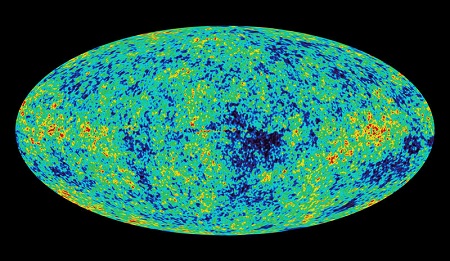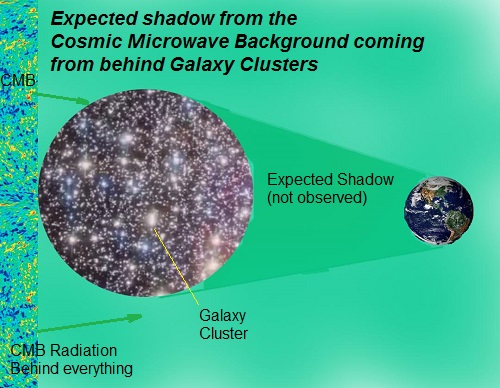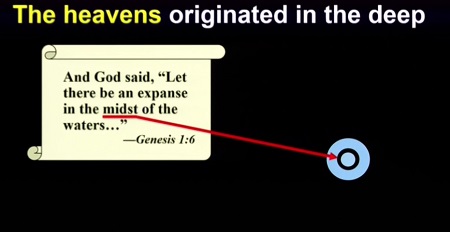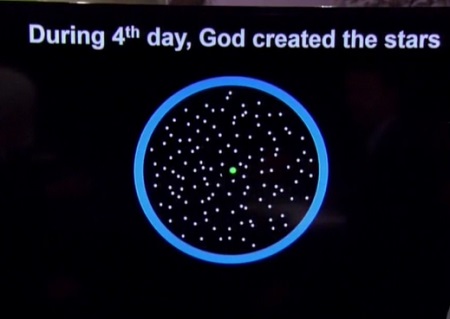|
|
What casts no shadows besides vampires? Apparently, the big bang.
In theory, scientists are objective seekers of the truth, handling the data that is discovered with honesty and integrity. Unfortunately particularly in sciences that have worldview implications, that is not the case. One of those sciences is cosmology - the science that attempts to determine the origin and development of the universe. With the possible exception of Darwinian evolution, there are no sciences that have larger worldview implications that cosmology. Even without knowing how the origin of the universe came about, the psalmist is correct in his declaration "the heavens declare the glory of God." (Ps 19.1) Atheist cosmologists know that and have tried to mute that testimony by attempting to come up with a story of the creation of the universe that doesn't involve God. Because even if you haven't formally studied apologetics or cosmology, everyone implicitly understands the Kalam Cosmological argument for the existence of God: Everything that begins to exist has a creator. The universe began to exist, therefore the universe has a creator. The only one powerful enough to create the universe is of course God, therefore God created the universe.
Such a simple, intuitive, easy to understand proof of the existence of God is anathema to atheist cosmologists because their own preferred theory of origins - the Big Bang theory - though incorrect nevertheless points to the fact that the universe had a beginning. And thus their own theory leads one to conclude God created the universe. Thus attempts are made to undermine that conclusion by re-enforcing the story that the big bang itself was a natural event, no divine interventions necessary. But the more data they discover, the more it is apparent that the Big Bang theory is incorrect because it defies the laws of physics - the very laws which secular physicists use to claim God was not needed.
What then is a devout atheist cosmologist to do to support his contention that the universe created itself apart from God? As I pointed out in the article from which this one derives its name, "Exposing the Big Magic Behind the Big Bang" such scientists have had to resort to slight-of-hand type tricks to support their conclusions, but in doing so they have to invoke logical fallacies such as equivocation on the word "nothing" and a shell game on things like the laws of physics and energy.
Today we look at two other tricks up the sleeve of the Big Bang magicians: the amazing disappearing shadow explanations, and the Baghdad Bob Big Bang propaganda distraction.
Disappearing explanations to explain
that the Big Bang Casts No Shadows

The above image is a WMAP (Wilkinson
Microwave Anisotrophy Probe) picture of cosmic temperature variations,
caused by cosmic radiation that is allegedly from "only" about 380,000
years after the Big Bang. (Allegedly because both scripture and
science gives evidence that the universe is much younger than that.)
Professor Anthony Aguirre of the University of CA, Santa Cruz describes
the image this way:
"This picture is actually something pretty amazing. It's a picture of our observable universe - just a couple of hundred thousand years after what we call the big bang. And it's a picture that's been taken of what's called the cosmic microwave background radiation. This is radiation that's come to us, to telescopes like this one [gesturing to a telescope behind him] and many others, and it gives us an actual image of what the state of the universe was like at incredible early times."[1]
According to secular scientific calculations, the universe is 13.77 Billion years old. Thus 380,000 years is -relatively speaking- very early in the development of the universe. If true, this radiation would provide a backlight to all the other objects in the universe (like galaxy clusters) that would be in the foreground. Such foreground objects should cast a shadow as in the diagram below.

Now unless the universe is like a vampire that casts no shadows, scientists should be able to detect a shadow from those foreground objects. Is that what they found? No. Christian cosmologist John Hartnett explains:
"In 2006 it was reported and published in the Astrophysical Journal...
...The study looked for a shadow in the CMB radiation cast in the foreground of galaxy clusters, which must be closer to us than the alleged source of the background radiation. The study involved 31 galaxy clusters with a net result indicating that on average no systematic shadows [emphasis his] were detected. In fact, the question was asked, Why are the clusters so relatively hot? Is there an additional source of emission that cancels out the expected shadow?"[2]
So how are the Big Bang magicians dealing with this - yet another failure of the Big Bang to be confirmed by empirical evidence? Once again they turn to the sleight of hand magic of poor reasoning:
"Either it (the microwave background) isn't coming from behind the clusters, which means the Big Bang is blown away, or ... there is something else going on," said Lieu. "One possibility is to say the clusters themselves are microwave emitting sources, either from an embedded point source or from a halo of microwave-emitting material that is part of the cluster environment.
"Based on all that we know about radiation sources and halos around clusters, however, you wouldn't expect to see this kind of emission. And it would be implausible to suggest that several clusters could all emit microwaves at just the right frequency and intensity to match the cosmic background radiation."[3]
Once again we see the invocation of the
logical false
dilemma used to magical effect: to maintain belief in spite of yet
further evidence that the Big Bang didn't happen. Notice the options
presented to explain the unexpected results:
1. The microwave background isn't behind the clusters because
(a) the Big Bang Blew it away
or
2. Some other unknown like:
a) The clusters themselves are providing "fill in light" (they admit
this his highly however.)
So here we have the amazing disappearing explanations. Let me make some
other explanations re-appear:
1(b) The Cosmic Microwave Background (CMB) isn't behind the clusters because the big bang never happened.
2(b) The CMB is due to some other phenomenon besides the big bang, an event that is not the "earliest" event so there is no expectation for it to be behind other objects and cast shadows.
But the Big Bang is more than a
scientific theory, it is one of the underpinnings of a secular
worldview. So secularists would rather not have their beliefs
challenged, thus it is not uncommon that options that undermine their
worldview are not presented as in this case. The other extreme
used to protect their worldview is to either overstate the implications
of evidence, or jump to (wrong) conclusions. In the next case, it's
both.
Baghdad Bob distractions to support undetectable Cosmic Inflation
The theory of inflation is key to the big bang, because without it, the big bang theory doesn't work - and every big bang believing scientist acknowledges that. Thus proving inflation has become key to proving the big bang. One prediction of inflation is a massive gravitational wave produced when the universe supposedly expanded 1078 in volume in one quintillionth of a femto second. (Or 10-18 x 10-15 = 10-33 seconds; so a 1078 expansion in volume in 10-33 seconds. That means the expansion was faster than the speed of light!) Cosmologist Anthony Aguirre explains the expectation this way:
"Some spectacular new data has come in very recently. And what this data has told us is something that inflation predicts - that there would be gravitational waves formed during the inflation process. These are ripples in space time - actually are there."
"It turns out those gravitational waves leave a tell-tale signature in a pattern of the background microwave radiation. And that signature has been searched for a long time because it's a prediction of inflation. And just recently it appears that it's been
seen."[4]
Thus every Big Bang believing scientist is hoping inflation induced gravitational waves will be found because "...if proven it's a tremendous victory for the theory of inflation." [5]
This desire caused a lot of premature proclamations of the discovery of primordial or inflation induced gravitational waves. Before going on let me note that gravitational waves are a prediction of Einstein's General theory of Relativity and in and of themselves say nothing about the origins of the universe. It's the primordial or inflation induced gravitational waves that cosmologists are looking for because they, in theory, are caused by the inflationary expansion of the universe.
So what exactly has been found? Was it the primordial gravitational wave? No. On March, 17, 2014, astrophysicists of the BICEP2 announced:
"...they observed millimetre-wave photons (at about 150 GHz) at the surface of the earth, with a South Pole based telescope."[6]
BICEP2 looks for a particular signature in the sky, due they believe, to a polarization of the CMB which they expect a primordial gravitational wave would produce. They interpreted the above to be that polarization. Of course polarized photons are not the same as gravitational waves, and claiming that the only possible explanation[7] for the observation is a gravity wave is a claim subject to the same error of the false dilemma as noted above. In other words something else could have produced the polarizing effect on the photons.
And in fact, that is precisely what noted physicist Dr Paul Steinhardt, a distinguished professor of physics at Princeton University concluded:
"Now a careful re-analysis by scientists at Princeton University and the Institute for Advanced Study, also in Princeton, has concluded that the BICEP2 B-mode pattern could be the result mostly or entirely of foreground effects without any contribution from gravitational waves. Other dust models considered by the BICEP2 team do not change this negative conclusion, the Princeton team showed.”[8]
Thus the claim of this observation being the "primordial wave" was retracted.[9] (No doubt to the delight of Steinhardt whose own theory of origins - one of a cyclic "Brane" collision which produces the big bang - would be disproved by the discovery of inflation induced primordial gravitational waves.)
More recently, LIGOS, a system designed to detect the gravitational waves themselves actually did detect a gravitational wave - twice[10] - the first one on September 14, 2015. Dr. Hartnett explains:
"...the two gravitational wave detectors of the Laser Interferometer Gravitational-Wave Observatory (LIGO)—one at Hanford, Washington and the other at Livingston, Louisiana—simultaneously observed a transient gravitational-wave signal. The signal exhibited the classic waveform predicted by Einstein’s general relativity theory for a binary black hole merger..."[11]
But was that the desperately sought primordial wave needed to bolster the evidence-less theory of inflation? No. LIGOS is not sensitive enough to isolate such a wave from background noise. The gravitational wave that was detected was the result of the merger of two black holes. Or as Dr. Hartnett puts it, "This unfiltered waveform shows the expected disturbance to spacetime as a function of time as the black holes spiral together."[12]
Two things to note here:
On the first detection - by BICEP2 - the excitement was palpable, but unwarranted as the further investigation determined what was observed was not a primordial gravitational wave. They had jumped to a conclusion.
Regarding the detections by LIGOS - which appear to be a legitimate detections of a real gravitation waves. Keep in mind the waves detected are known to be from merging black holes, not a primordial wave. Furthermore LIGOS is unlikely to ever detect a primordial wave because it currently is not sensitive enough to separate the wave signal (which would be no more than a mere relic - a so called "stochastic signal"[13] from the supposed big bang 13.77 billion years ago) from background noise.
Thus the second detection comes with a cautionary warning. Scientists are under great pressure to find the elusive (non-existent things tend to be elusive) primordial gravitational wave. And scientists are human - with bills to pay, careers to advance and most importantly - a world view to promote. Given those pressures: beware the tricks of jumping to conclusions and exaggeration the next time you hear a claim that a "primordial gravitational wave" has been discovered that "proves inflation and the big bang theory is true" - make sure someone isn't jumping to conclusions or exaggerating.
Don't be taken in by Baghdad Bob like proclamations. Baghdad Bob - the former Iraqi Information Minister during the Iraq war - was known for the outrageous lies he told denying the progress of American forces even as they advanced audibly on Iraqi positions. He and the Iraqis were so intent on presenting a particular image of success, they didn't care about the truth. Unfortunately, such pressures to present a particular image could breach the walls of science. If they do, you will likely see the above tricks in support of claims that a cosmic inflation generated primordial wave "proving" the big bang has been detected. Don't fall for them. Because once again scientists will likely to be exaggerating and jumping to conclusions. There is after all another option that they will never consider.
Could God have created a Primordial Gravitational Wave?
In considering the possibility that
scientists might mistake a gravitational wave generated by God for one
generated by the big bang, there are two questions to consider:
1. Could God have created a primordial gravitational wave as the big
bang stipulates - by initiating the Big Bang; or using an
inflationary event to create stars on the fourth day?
2. Could God have created a primordial gravitation wave by following the Genesis account of creation?
As to the first question - the answer
is clearly no - God did not create by initiating the Big Bang for two
reasons:
First because the Big Bang sequence of events does not align with the
Biblical account.[14] For instance in the big bang model, stars
emerge first after the singularity because they are needed to create the
elements necessary to create everything else - heavy metals,
planets, life, etc. In the Biblical model, the earth is the first thing
created - even before the stars.
Second - God would not have used an inflationary type event as described in the big bang to create the stars on the fourth day because it would have destroyed the earth before he completed the creation week. Let's consider what would have happened if he did.
In that scenario - where God creates an inflationary event to create the stars, He would be moving all the mass in existence from the center of the universe - which would have been where God created the earth, to the farthest reaches of the universe. That would create such a gravitational wave. But it would also have destroyed the plants that God already made on the third day (Gen 1.11-13). Astronomer Michelle Thaller explains the devastation due to a star nearing the end of its life that expands past planets in its orbit:
"And when the core has no more hydrogen, it's going to bloat up into a red giant star. Now red giant stars are so big they will actually eat up their own planets. We know of examples of red giants that go all the way out to where the orbit of Jupiter is in our solar system."[15]
If the energy of a hydrogen exhausted expanding Sun is sufficient to destroy all life on earth as it expands past the earth, how much more would expanding all the energy/mass in the universe (minus the earth) much more do the same - had God done that on the fourth day to create stars? It makes no sense for God to create vegetation on day 3, just to destroy it on day 4 by exploding all the energy in the universe past the earth with an inflationary event in order to have the stars wind up billions of light years away from the earth. Not only does it make no sense, but there is no indication in scripture that God created vegetation, destroyed it (and habitable conditions on earth), then recreated it. Thus the inflationary scenario does not fit in - any Christian understanding of the creation.[16]
Let us consider then the second question: Could God have created a primordial gravitational wave in the process of doing the events of creation as depicted in Genesis? Possibly. We can see why as we look at the cosmology proposed by creationist physicist and cosmologist Russell Humphreys. On a recent visit to Creation in the 21st Century[17] (viewable here) Dr. Humphreys demonstrated how distant starlight (an apparent problem for creationists that we looked at here), from stars billions of light years away could have arrived on earth on the fourth day as the Bible states. He makes a persuasive case involving relativity and timeless zones - but for our purposes we need merely look at the first few days of creation to see if it's possible that a gravitational wave could have been produced in the process.
First let's consider the conditions necessary to create such a wave. To create a gravitational wave, you need to accelerate a mass. So the mere act of you waving your arms generates gravitational waves. Those waves are so small they are undetectable, but the acceleration of mass is all that's needed. To create a "primordial" gravitational wave, you need to accelerate all the mass in existence (the entire universe) very rapidly. That - say the big bang magicians - is what happened at the beginning of the universe. And that is large enough that it should have left a detectable imprint. But could God have accelerated sufficient mass to create a similar wave generated under different circumstances? Yes, and because it was generated under different circumstances, the properties should be different. Here's why:
As Dr Humphreys explains the Genesis narrative, on the first day God created "the deep" (Gen 1.2) which is a mass of water much larger than the earth. On the second day, within the deep, God created an expanse - which he called "sky" (Gen 1.8) which separates the earth from the rest of the deep. (Graphic 1)

Graphic 1: The expanse (sky) separates the earth from the rest of the
deep
In Gen 1.14-16 God creates the Sun, moon
and stars on day four, meaning he would have had to expand the
expanse/(sky) to make room for the stars. (Graphic 2)

Graphic 2: The expanse expanded to accommodate the stars
Finally, he populated the expanse with the
stars. (Graphic 3)

Graphic 3 - Having expanding the expanse, God populates it with stars
Now consider what had to have happened between graphic 1 and graphic 2: The waters of the deep had to have been accelerated outward to the furthest reaches of space - beyond the visible universe. That event would have indeed created a large gravitational wave. I'm not a physicist, but I'd be willing to bet that the imprint, the polarization of light created by of a gravitational wave generated by a mass of moving water is different from the imprint created by the "reverse gravity" inflationary scenario of the big bang.[18] Critics say creation science is not science because it cannot be tested. Well here is another[19] prediction of creation science that is testable by physicists - if they're brave enough. (They might not be because some would not want to discover the answer if it could be proved that the primordial gravitational wave was created by the movement of a huge mass of water as the Bible states.)
The final step - God could have created the stars in their final destination - without needing to invoke inflation.
Conclusion
So scientists might very well discovery a primordial gravitational wave.
But here's a prediction of creation science - it's properties - if they
can identify them - should be consistent with the movement of a huge
mass of water, instead of the current belief that the wave was
created by the faster than the speed of light, reverse gravity scenario
of the big bang inflationary period.
Thus it is clear the conditions necessary to create a cosmic inflation induced primordial gravitational wave never existed. So if someone tells you "look, here it is" or "look, there it is," rest assured that whatever they're pointing to is not a gravitational wave created by inflation. They will be jumping to conclusions as the big bang magicians have done in the past. Don't go for it. In due time it will be revealed how the universe conforms to God's word - which does not include the big bang theory as secular materialists describe it.
Duane Caldwell | posted 10/17/2016
Follow @duanecaldwell
Notes
1. Anthony Aguirre, ref. from Which Universe Are We In?, BBC
Documentary, 2014
back
2.
John Hartnett, ‘Light from the big bang’ casts no shadows, Creation
(Magazine) 37(1):50–51
January 2015; online: Creation Ministries Int'l (CMI),
http://creation.com/big-bang-casts-no-shadows
back
3. Richard Lieu, ref. from Big Bang's
Afterglow Fails Intergalactic 'Shadow' Test, ScienceDaily, 5/5/2006,
https://www.sciencedaily.com/releases/2006/09/060905104549.htm
back
4. Anthony Aguirre, ref. from
Which Universe Are We In?
back
5. Narrator, Which Universe Are
We In?
back
6. John Hartnett, Has the ‘smoking
gun’ of the ‘big bang’ been found?, CMI, 20 March 2014,
http://creation.com/big-bang-smoking-gun
back
7. Or more precisely "less than one
chance in two million of it being a random occurrence."
Paul Steinhardt referencing the BICEPS2 statement.
http://creation.com/multiverse-bubble-bursts
back
8. Paul Steinhardt, ref from Alexander
Williams, Big Bang blunder bursts the multiverse bubble, CMI, 12
June 2014,
http://creation.com/multiverse-bubble-bursts
back
9. John Hartnett, What impact does the
detection of gravitational waves have on biblical creation?, CMI, 16
February, 2016,
http://creation.com/detection-of-gravitational-waves-and-biblical-creation
back
10. The second detection being on Dec 26,
2015
Second gravitational wave signal detected, Science News,
6/15/2016
https://www.sciencenews.org/article/second-gravitational-wave-signal-detected
back
11. Hartnett, What impact
back
12. Hartnett, What impact
back
13. "...a “Stochastic Signal”, so called
because the word, 'stochastic' means, having a random pattern that may
be analyzed statistically but may not be predicted precisely. These will
be the smallest (i.e. quietest) and most difficult gravitational waves
to detect, but it is possible that at least part of this stochastic
signal may originate from the Big Bang."
LIGO Caltech, Sources and Types of Gravitational Waves, accessed
10/16/2016,
https://www.ligo.caltech.edu/page/gw-sources
back
14. For more on how the Big Bang sequence
of events differs from the Biblical account, see:
John Hartnett, The Big Bang is Not a Reason to Believe!, CMI, 20
May 2014,
http://creation.com/big-bang-not-a-reason
back
15. Michelle Thaller ref from How the
Universe Works episode "End of the Universe" Science Channel
Documentary, 2014
back
16. This includes Hugh Ross' syncretistic
understanding. Hartnett's article The Big Bang is Not a Reason to
Believe! referenced above is apparently a rebuf of the position of
Hugh Ross and his organization Reasons to Believe. Ross is a Christian
scientist who believes the Big Bang - including inflation - is true (see
http://www.reasons.org/articles/cosmic-inflation-it-really-happened
) and so uses the Big Bang in his apologetics to defend creation by God.
I personally believe you shouldn't use fictions (like Santa Claus when
talking of Christmas and the nativity) to defend the Bible, and it is
clear the Big Bang is fiction, so I stand with Hartnett on this matter -
rejecting Ross' approach. Christians need not appeal to the Big Bang to
support both science and the Biblical account as I've demonstrated in
various articles.
back
17. Creation in the 21st Century,
episode "Starlight Time and Physics" featuring Dr. Russell Humphreys,
TBN broadcast 8/26/2016; archived here:
http://creationinthe21stcentury.com/starlight-time-and-physics-with-david-rives-and-dr-russell-humphreys-on-tbn/
back
18. The theory of Inflation stipulates
that gravity acts in reverse for a short period to drive inflation. Here
is an explanation by it's creator, Alan Guth:
http://rationalfaith.com/print/cosmic-inflation.htm
back
19. Russell Humphreys made predictions
about the magnitude of the magnetic fields based on the biblical
creation account that was subsequently confirmed. That is covered
briefly in my article Earth’s magnetic field: Testament to more than
a young earth, 12/8/15,
http://thecreationclub.com/earths-magnetic-field-testament-to-more-than-a-young-earth/
back
Featured Image © flexdreams / WavebeakmediaMicro / fotolia
WMAP - NASA - Public Domain
Expected Shadow from the CMB © Duane Caldwell
The Earth in the Deep graphics - Russell Humphreys presentation -
Creation in the 21st Century
